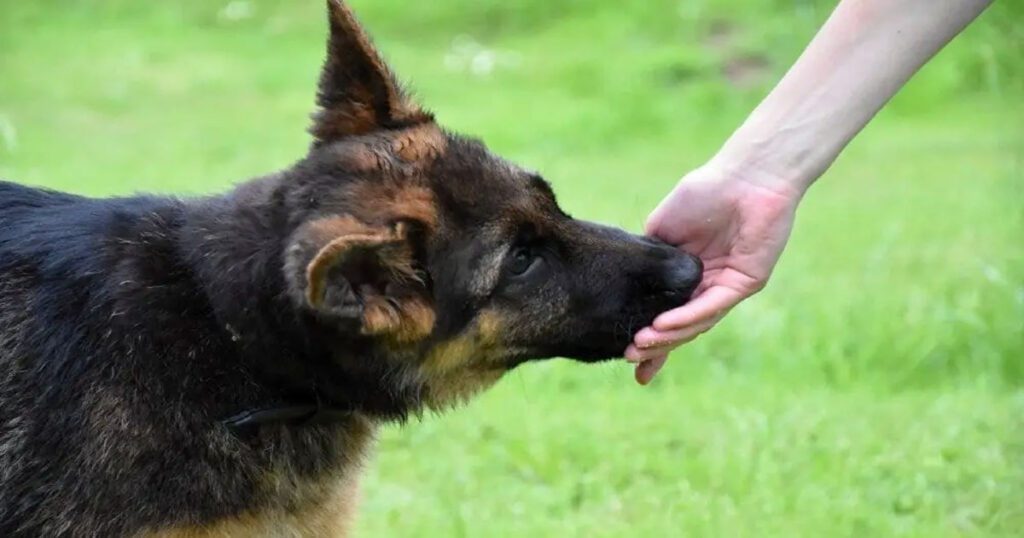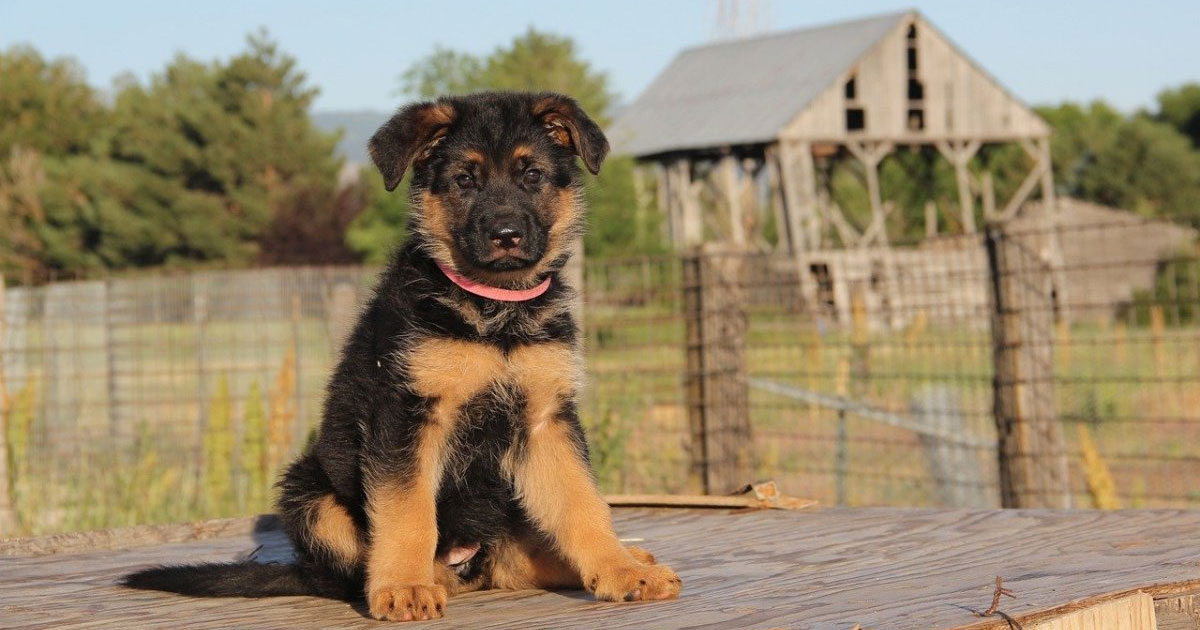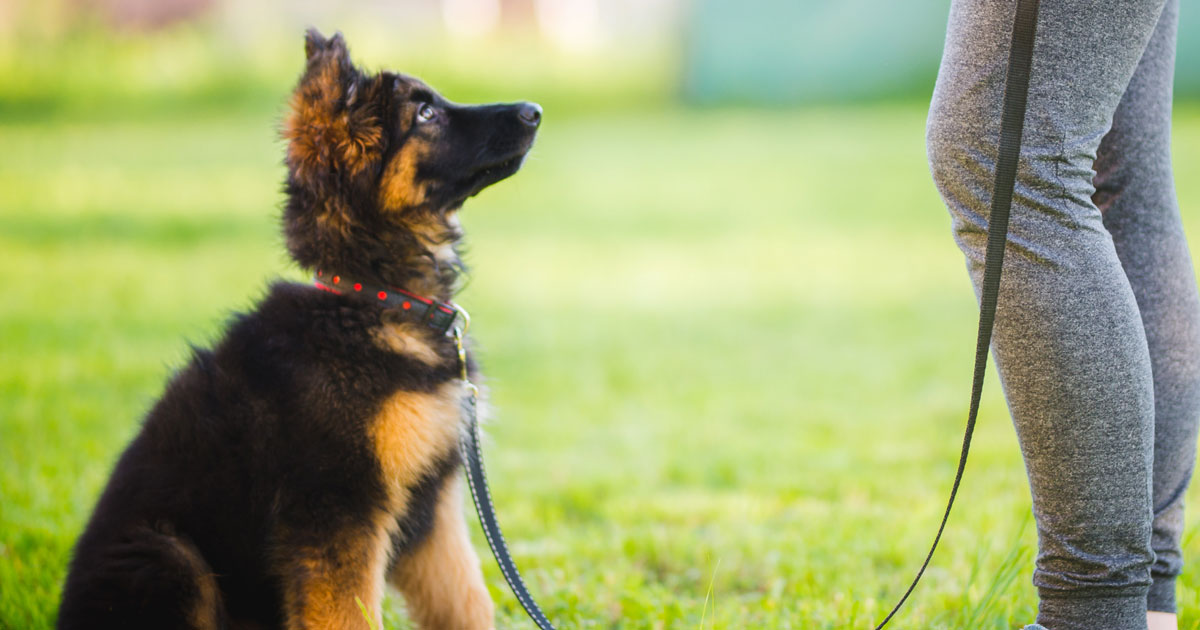Disciplining a German Shepherd puppy requires a balanced approach that combines positive reinforcement with clear boundaries and consistent training.
Some effective guidelines for disciplining a German Shepherd puppy are:
- Start with positive reinforcement
- Establish rules and boundaries
- Use redirection
- Avoid physical punishment
- Consistent training
- Socialization and exercise
In this article, we will explore effective methods to discipline your German Shepherd puppy that emphasizes positive reinforcement, consistency, and clear communication. So, let’s start.
Table of Contents
Disciplining Your German Shepherd Puppy!
German Shepherd puppies are adorable bundles of energy and curiosity. It’s not uncommon for them to exhibit behaviors that make it seem like they’re not listening or following instructions.
Understanding why this happens is crucial in effectively disciplining your German Shepherd puppy.
Why Your German Shepherd Puppy is Not Listening?
- Lack of Basic Training
- Distractions and Overstimulation
- Inconsistent or Unclear Commands
- Fear or Anxiety
- Testing Boundaries
Addressing these factors and implementing appropriate disciplinary techniques will help your German Shepherd puppy become more attentive and responsive.

Understanding German Shepherd Puppies
German Shepherd puppies are known for their intelligence, loyalty, and energetic nature. Understanding their unique characteristics is vital when it comes to training and disciplining them.
These puppies are highly trainable and eager to please, making them great candidates for obedience training.
German Shepherd puppies require early socialization to develop good manners and proper behaviour. It’s important to expose them to various environments, people, and animals to help them grow into well-rounded dogs.
How To Discipline a German Shepherd Puppy?
Disciplining a German Shepherd puppy requires a combination of positive reinforcement, consistency, and patience. Here are some effective techniques to discipline your furry friend:
- Positive Reinforcement
Use rewards, treats, and praise to reinforce desired behaviours such as sitting, staying, and walking on a leash.
- Consistent Commands
Ensure that your commands are clear, concise, and consistently used. German Shepherd puppies thrive on routine and consistency.
- Timeouts
If your puppy exhibits unwanted behaviour, consider implementing short timeouts to redirect their attention and discourage the behaviour.
- Firm but Gentle Approach
Avoid harsh punishments or physical force. Instead, use a firm yet gentle approach to correct inappropriate behaviour.
- Socialization & Exercise
Get them to exercise regularly. Expose your puppy to different environments, people, and animals to build their confidence and reduce fear or anxiety-driven behaviors.
Positive Reinforcement Training for German Shepherd Puppies
When it comes to disciplining German Shepherd puppies, positive reinforcement is a highly effective approach.
- This training method focuses on rewarding desired behaviours rather than punishing unwanted ones.
- By using treats, praise, and rewards, you can reinforce positive actions and encourage your puppy to repeat them.
- Positive reinforcement creates a positive association in your puppy’s mind, making them more motivated to listen and obey.
- For example, when teaching your German Shepherd puppy to sit, reward them with a treat and enthusiastic praise when they successfully follow the command.
- This positive experience encourages them to continue displaying the desired behavior.
Consistency and Establishing Rules with Your German Shepherd Puppies
Consistency plays a vital role in disciplining German Shepherd puppies. It is essential to establish clear rules and boundaries from the beginning to avoid confusion. When your puppy understands what is expected of them, they are more likely to exhibit good behavior.
- To establish consistency, create a set of rules that everyone in the household follows consistently.
- This includes guidelines on where the puppy is allowed to go,
- what furniture they can access, and proper behavior during playtime.
- Reinforce these rules by redirecting your puppy when they break them and rewarding them when they comply.

Effective Communication with Your German Shepherd Puppies
Dogs rely on various forms of communication, including body language, tone of voice, and verbal cues, to understand and respond to commands.
- When giving commands, use a firm but calm tone of voice and maintain confident body language.
- Make sure your verbal cues are clear and consistent, using the same command word for each behavior.
- For example, use “sit” instead of alternating between “sit down” and “park it.”
Pay attention to your puppy’s body language as well. They may display signs of understanding or confusion. Positive reinforcement training is most effective when you can communicate your expectations clearly and in a way your puppy understands.
Remember to be patient, understanding, and always reward their efforts and progress.
Avoiding Harsh Punishments to Your German Shepherd Puppies
When disciplining German Shepherd puppies, it is important to avoid harsh punishments. While it may be tempting to resort to punitive measures, such as yelling or physical force, these methods can have detrimental effects on your puppy’s well-being and the trust between you and your furry friend.
Harsh punishments can lead to fear, anxiety, and even aggression in German Shepherd puppies. Instead, focus on positive and gentle training methods.
Positive reinforcement, as mentioned earlier, is highly effective in shaping desired behaviors. Use treats, praise, and rewards to encourage good behavior and redirect unwanted behavior.
Consistency in Family Training
Establishing consistent rules in the family, commands, and expectations helps your puppy understand what is expected of them, regardless of who is giving the command.
To ensure consistency, hold regular family meetings to discuss training methods and reinforce the importance of everyone following the same approach.
Create a training schedule that allows each family member to participate and provides clear guidelines on how to communicate and interact with the puppy consistently.
Seeking Professional Help When You Need
While training and disciplining a German Shepherd puppy can be a rewarding experience, some situations may require professional assistance.
If you find yourself struggling to address specific behavior issues or if your puppy’s behavior poses safety concerns, seeking help from a qualified trainer or behaviorist is a wise decision.
When looking for a professional, consider certifications, experience working with German Shepherds, and positive reviews from previous clients.
Their expertise will help you navigate any difficulties and ensure a harmonious relationship with your German Shepherd puppy.
Frequently Asked Questions
Q: How do I get my German Shepherd puppy to listen?
Ans: To get your German Shepherd puppy to listen, use positive reinforcement techniques such as treats, praise, and rewards to reinforce desired behaviors. Be consistent with your commands and training, establish clear rules, and practice patience and consistency.
Q: Why is my German Shepherd puppy so disobedient?
Ans: German Shepherd puppies can be disobedient due to a variety of reasons, including insufficient training, distractions, inconsistent commands, fear or anxiety, or testing boundaries.
Q: How do you discipline a German Shepherd for biting?
Ans: When disciplining a German Shepherd puppy for biting, it’s important to redirect their behavior by offering appropriate chew toys or bones as alternatives. Avoid using physical force or harsh punishments.
Q: German Shepherd puppy behavior stages?
Ans: Training a German Shepherd puppy at home involves setting a routine, using positive reinforcement techniques, and being consistent with commands and expectations. Start with basic obedience training, such as teaching sit, stay, and come, and gradually progress to more advanced commands. Use rewards, treats, and praise to reinforce desired behaviors.
Q: How to play with a German Shepherd puppy?
Ans: When playing with a German Shepherd puppy, provide mental and physical stimulation through interactive games, such as fetch or puzzle toys. Engage in activities that encourage exercise, agility, and problem-solving. Remember to supervise playtime, ensure safety, and establish boundaries to maintain a balanced and enjoyable play experience.
Conclusion
In conclusion, disciplining a German Shepherd puppy is a vital aspect of their training journey. By implementing positive reinforcement techniques, establishing clear rules and boundaries, and maintaining consistency, you can shape your puppy’s behavior effectively.
It is important to avoid harsh punishments and opt for gentle training methods that foster trust and a strong bond between you and your furry friend.
Remember, seeking professional help when needed is a sign of responsible ownership and can provide valuable guidance in addressing specific challenges.
With patience, love, and the right approach, you can successfully discipline your German Shepherd puppy and set them on the path to becoming a well-behaved and cherished companion. Good luck!

I’m David, an expert contributor and writer, with two furry friends of my own, I know the challenges of raising and caring for dogs. From training to nutrition and health, my goal is to provide valuable insights and advice to help create strong bonds and happy, healthy lives. Find me in Twitter.




